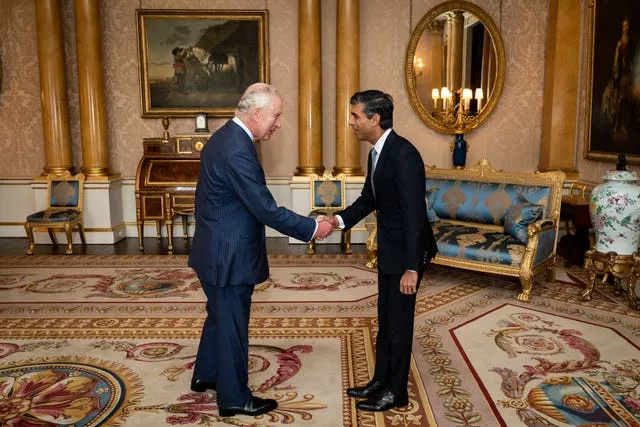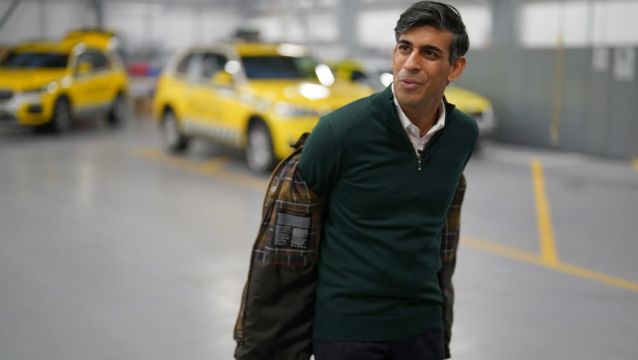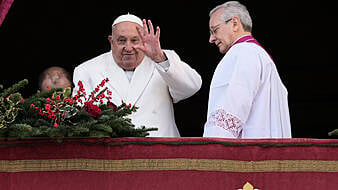UK prime minister Rishi Sunak has said he is working towards a general election in the second half of the year after coming under pressure to call a vote soon.
Mr Sunak said on Thursday it is his “working assumption” that he would not be sending the public to the polls in the spring, as opposition figures have been talking up.
He dangled the prospect of future tax cuts to voters and attacked UK Labour leader Sir Keir Starmer’s green proposals as the two leaders set out their stalls at the start of the election year.
Labour has claimed that a spring vote is the “worst kept secret in Parliament” in a possible ploy to claim Mr Sunak has bottled it if he goes longer.

The Liberal Democrats have also been calling for Mr Sunak to hold the vote in May rather than trying to “cling on” to power for the rest of the year.
But Mr Sunak told broadcasters on a visit to a youth centre in Mansfield, Nottinghamshire: “So my working assumption is we’ll have a general election in the second half of this year and in the meantime I’ve got lots that I want to get on with.”
The Conservative leader declined to rule out a May election categorically but repeated his intentions to go for later in the year.
“I want to keep going, managing the economy well and cutting people’s taxes.
“But I also want to keep tackling illegal migration,” Mr Sunak said.
“So I’ve got lots to get on with and I’m determined to keep delivering for the British people.”
Mr Sunak has until January 2025 to hold the election. Waiting gives him more time to turn around the Tories’ dire polling, but also risks another summer of small boat crossings as he struggles to get the Rwanda policy off the ground.
Both the Conservatives’ and Labour’s long election campaigns were well under way on Thursday, as both party leaders visited battleground areas.
Mr Starmer pleaded with voters to hang on to the “flickering hope in your heart that things can be better” amid the “understandable despair of a downtrodden country”.

He indicated that if he won the election he would wait to grow the economy before fulfilling a desire to cut taxes on working people, in a dividing line with the Tories.
Mr Sunak raised the prospect of further tax cuts after the incoming easing of national insurance, despite the Conservatives taking the overall tax burden to the highest since the Second World War.
Speaking to an assembled group in Mansfield, Nottinghamshire, he said he would “keep cutting people’s taxes”.
“We want to do more because as we manage the economy responsibly, we can cut your taxes, give you and your family peace of mind, immediate relief from some of the challenges you’re facing and confidence that the future is going to be better for you and your children,” he said.
“That is going to be the single biggest difference between us and the Labour Party in the next election.”
Mr Sunak attacked Labour’s £28 billion-a-year green energy investment plans, which are designed to bring down bills, drive growth and reduce reliance on overseas fuels.

Mr Sunak claimed it cannot be done “without putting up inflation, without putting up mortgage rates or without putting up all your taxes”.
“We are going to keep talking about it because ultimately it’s going to impact everyone in this country and we’re going to cut their taxes and make sure everyone knows that if they ever get a lefty, your taxes are going up,” he said.
But after his own speech at a research facility near Bristol, Mr Starmer hit out at Tory attacks as “misconceived” and acknowledged the scale of the plans could be reduced.
He said that “if the money is from borrowing, which it will be, borrowing to invest, that the fiscal rules don’t allow it, then we will borrow less”.
He said: “In principle, I do want to see lower taxes on working people, I want people to have more money in their pocket”.
However, he stressed that the “first lever that we will pull is the growth lever, because in the end that’s the only way we’re going to get the money we need to fund our public services”.
In another possible dividing line, the Labour leader said he is “fundamentally opposed” to axing or reducing inheritance tax on the wealthy, a move being mooted by the Tories.







